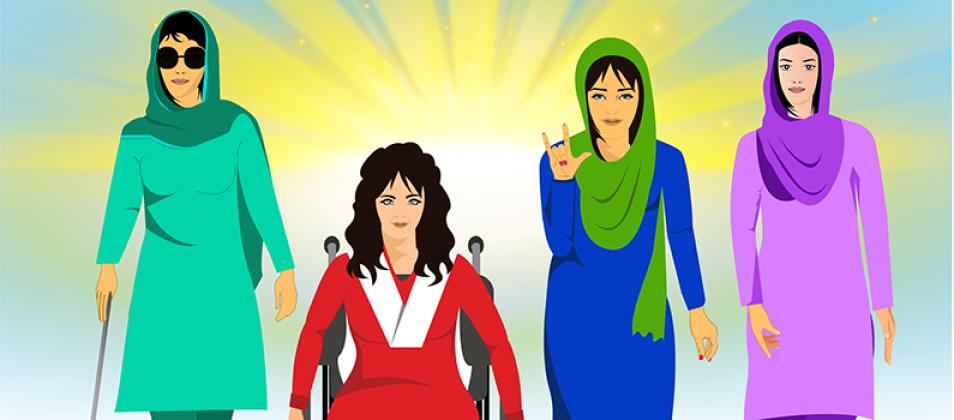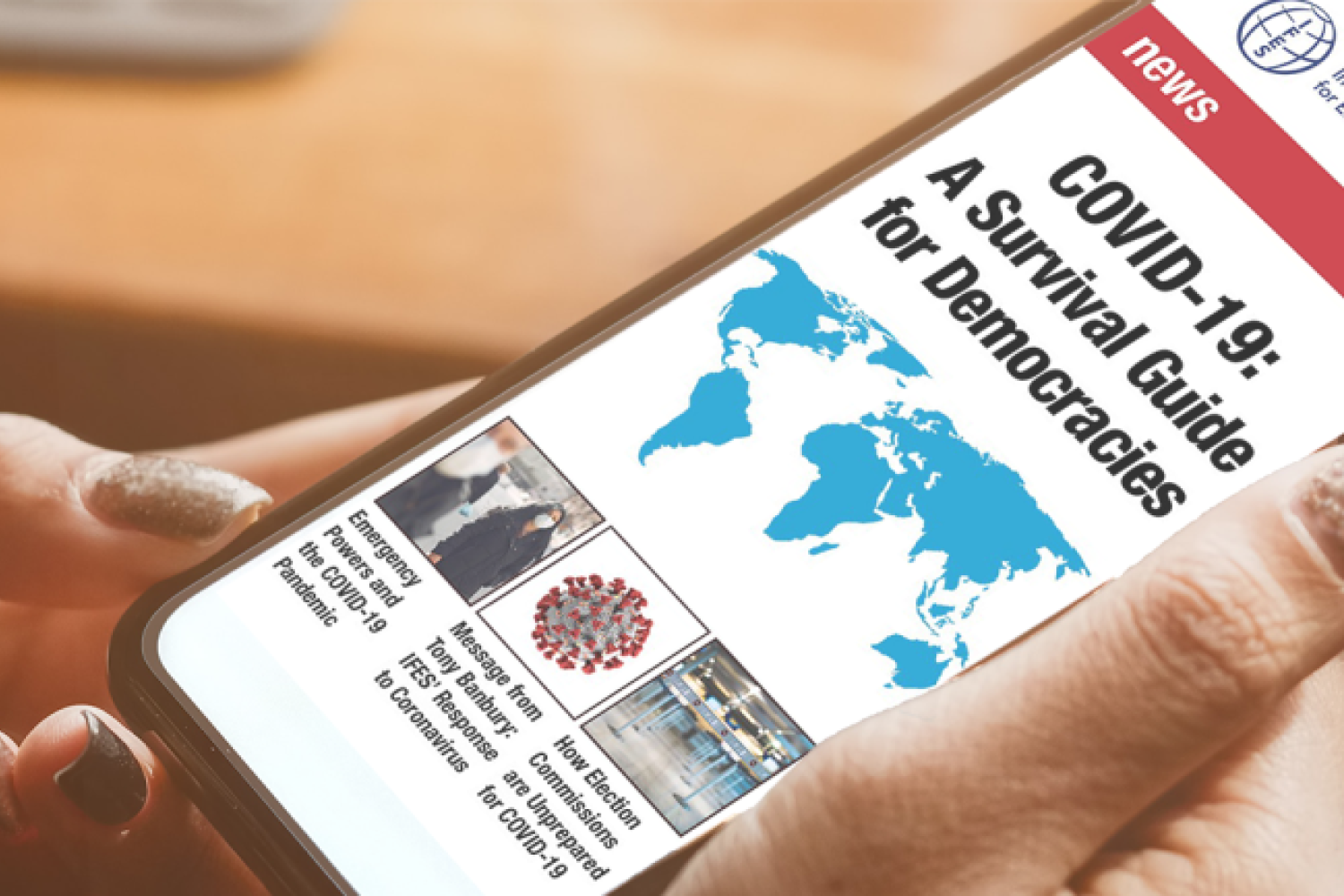
Online Training Launched to Engage Pakistani Women with Disabilities in Public Policy Reform
The International Foundation for Electoral Systems (IFES) is actively innovating and adapting its programming to ensure inclusive governance during the COVID-19 pandemic. As part of these efforts and in partnership with the Special Talent Exchange Program (STEP) and supported by Global Affairs Canada, IFES adapted its “Power to Persuade: Empowering Women with Disabilities to Influence Public Policy” training methodology for online implementation in Pakistan in July 2020. IFES’ “Power to Persuade” training builds the skills of women with disabilities to advocate with policymakers, elected officials and other political powerbrokers for reform.
Digital Assessment Survey
Before adapting the training, IFES and STEP conducted a short survey with “Power to Persuade” program participants to gather information on their access to technology and digital platforms at home during the COVID-19 pandemic, as well as any reasonable accommodations they might need to participate in an online training. Survey results were used to inform adjustments to the training curriculum and identify key barriers to inclusion of women with disabilities. The survey was implemented through phone and video calls with 50 women with disabilities across four provinces in Pakistan. Respondents indicated that the major barriers they have experienced as a result of the COVID-19 pandemic include a lack of access to health care, relief services, personal assistance and accessible information related to COVID-19.
The survey also indicated that nearly all respondents have access to a smartphone at home. A majority indicated that their access to a separate room or quiet space to participate in an online training is limited to a couple of hours per day and that they prefer online training sessions to be held in the afternoon. While 64 percent had never participated in an online training, all respondents expressed interest in participating in “Power to Persuade Online.” Around two-thirds of respondents requested sensory breaks during the training and several respondents also requested sign language interpreters or personal assistants to facilitate their participation in the online training.
Program Adaptations
In response to these survey results, IFES and STEP updated the training methodology, adapting it from a three-day, in-person training to an online version that can be run in 10 two-hour modules, with online homework assignments for participants to complete between modules. Sensory breaks and sign language interpretation were also integrated into the curriculum. In recognition that most survey respondents had not previously participated in an online training, STEP developed guidelines for participating in an online training and instructions for using online platforms, which will be included in the training orientation.
In light of the COVID-19 context and in response to survey results, IFES and STEP updated the curriculum to focus on building participants’ capacity to identify the government bodies in charge of the COVID-19 response for their advocacy efforts; to identify current COVID-19 response policies and any gaps in these policies that impact women with disabilities; and to integrate advocacy strategies for participants to engage in while remaining safe at home during the pandemic.
Since the “Power to Persuade” training uses an interactive adult learning methodology when conducted in person, IFES found innovative ways to replicate this experience online. For example, virtual icebreakers, polls, quizzes and matching games were integrated into “Power to Persuade Online” to enhance engagement and increase cohesion among participants. By using features such as breakout rooms, “Power to Persuade Online” aims to foster a sense of community and dialogue among participants regarding shared policy priorities, including those related to an inclusive COVID-19 response. IFES also adapted its policy platform methodology to a virtual environment, providing participants with an opportunity to identify barriers to and recommendations for inclusion of women with disabilities during the pandemic. STEP has also established a WhatsApp group to facilitate interaction among participants between modules, which will help create a support community of peers and fellow influencers.
Lessons Learned
Once these adaptations were integrated into the training, IFES organized a training of trainers (ToT) to prepare STEP master trainers to implement “Power to Persuade Online” with women with disabilities across Pakistan. The process of developing IFES’ “Power to Persuade Online” training methodology generated key lessons for future iterations, including:
- Ahead of the training, facilitators should aim to gather information on participants’ access to technology at home, level of experience using virtual platforms, and any reasonable accommodations they might need to participate in an online training. Facilitators should also collect information on when and for how long participants will be available to participate in an online training to inform the training schedule.
- Facilitators should familiarize themselves with the intended platform and its accessibility features to ensure it is accessible to participants with different types of disabilities. This should include, for example, checking whether intended platforms are compatible with assistive tools such as screen readers.
- Adjustments to the curriculum should be made after practice sessions to reflect any lessons learned. Following the ToT with STEP master trainers in Pakistan, step-by-step instructions on how to facilitate interactive training activities using virtual platforms such as Zoom and Google Docs were integrated into curriculum updates. Additional time was added to each module to account for any technological or connectivity issues that might arise.
- Orientation sessions should be provided for participants ahead of the training to familiarize them with the intended virtual platforms and to ensure any technological or connectivity issues are resolved in advance.
- A sufficient number of facilitators should be prepared to serve as a backup in each training in case any facilitators experience connectivity issues, and to ensure that facilitators can participate in designated breakout sessions to support participants who may be new to using online platforms.
- All training materials should be shared with participants in advance of the training in an accessible format, such as a Word document or PowerPoint with alt-text.
- A WhatsApp group or communication platform should be set up for facilitators to communicate with one another, as well as for facilitators and participants to communicate throughout the training.
Lessons learned from the pilot in Pakistan will be used to inform the implementation of “Power to Persuade Online” in Bangladesh and Sri Lanka.
The “Power to Persuade Online” pilot was made possible through the support of Global Affairs Canada.
Published on July 15, 2020.
















